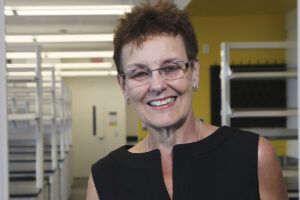
Karen Seibert, a deeply respected leader in pharmacology at Washington University School of Medicine in St. Louis, died Monday, Nov. 9, 2020, at her home in Chesterfield, Mo., after a battle with a cancer. She was 61.
Seibert wore many hats in her long, successful career. She was the founding executive director of the Center for Clinical Pharmacology, a formal collaboration between Washington University and the newly named University of Health Sciences & Pharmacy. In addition to that role, she was a professor of anesthesiology, of pathology and immunology, and of genetics at the School of Medicine. Further, she was associate director of shared resources for Siteman Cancer Center, in conjunction with Washington University and BJC HealthCare.
Seibert also had leadership roles in research collaborations between Washington University and the biopharmaceutical company Pfizer Inc., and the university and Mallinckrodt Pharmaceuticals. The collaborations were established to provide opportunities for academic researchers to translate and transform concepts into breakthroughs leading to drug discovery.
“As anyone who knew Karen can appreciate, she was a true force of nature – brilliant with a deeply inquisitive mind, a wonderful sense of humor, and a remarkable ability to bring people together and form partnerships,” said Michael Avidan, MBBCh, the Dr. Seymour and Rose T. Brown Professor of Anesthesiology and head of the Department of Anesthesiology. “When she was recruited to our department to be the co-director of the Center for Clinical Pharmacology, she embraced it with her usual tenacity and entrepreneurial spirit. She worked through all of the challenges of establishing an inter-institutional venture and cut through administrative barricades with a fierce determination that nothing would get in the way of this very important mission.”
Before Seibert took on her role at the center, she developed and led the clinical genomics group known as Genomics and Pathology Services at the School of Medicine. There, she led an effort to develop genomic-based clinical tests for use in the diagnosis and treatment of patients with cancer and other diseases.
Before joining the faculty in 2010, she spent nearly 20 years in the pharmaceutical industry, at Pfizer Inc. Her first 10 years were devoted to the development of the arthritis pain-relief drug Celebrex. During her second decade there, she became a vice president of research and development for Pfizer’s St. Louis labs and led searches for new treatments for arthritis, heart disease, diabetes and other conditions.
She came to Pfizer after working as a Washington University postdoctoral fellow in the lab of Philip Needleman not long before his group identified an enzyme known as COX-2 that produces pro-inflammatory prostaglandins. They showed that COX-2 is a critical component in processes that cause inflammation and pain. Celebrex is a COX-2 inhibitor.
Seibert earned a bachelor’s degree in biological sciences from Northwestern University, a master’s in pharmacology from the University of Toledo College of Pharmacy, and her doctorate from Vanderbilt University School of Medicine.
She received numerous honors over her career and was so highly regarded that Siteman Cancer Center this month renamed her position there, in perpetuity, the Karen Seibert Associate Director of Shared Resources. Also, before her death she was informed that Siteman had created the Karen Seibert Lifetime Achievement Award and that she was its first recipient.
“Karen was a transformational leader, as well as an important voice for improving our overall effectiveness,” said Timothy Eberlein, MD, Siteman’s director, the Spencer T. and Ann W. Olin Distinguished Professor, the Bixby Professor and head of the Department of Surgery at the School of Medicine. “She was a wonderful mentor, positive force and effective problem solver. Everyone who worked with Karen loved her and respected her. She will be missed by all of us every day.”
Seibert, who grew up in Cleveland Heights, Ohio, is survived by her husband, Robert Boyd; sister, Kathryn Howe (James); mother-in-law, Rosemary Boyd; and numerous in-laws, nephews, nieces and friends.
A private memorial service is planned.
To honor Seibert’s strong support of social justice issues, memorial contributions may be made to Unleashing Potential. The organization offers a continuum of care designed to improve the quality of life for children and families in the urban core and inner ring suburbs of St. Louis.